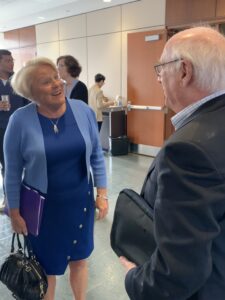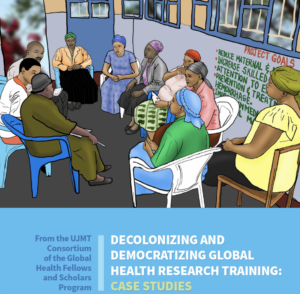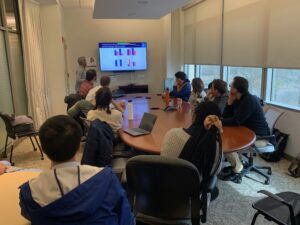The 2nd Annual Global Health Scholars Symposium took place Friday, Feb. 16, showcasing the impactful work of 43 trainees in the U.S. and around the world. Near and far, approximately 250+ participants came together to share and learn about global health research.
Opening Remarks
Suzanne Maman, PhD, the associate dean for global health at UNC Gillings School of Global Public Health, welcomed a packed auditorium.
“As much as this is a celebration of the hard work of our students and trainees, it is also a celebration of our unique collaborations in Malawi, Zambia, Vietnam, China and other sites.”

Keynote speaker Barbara Stephenson, PhD, UNC’s Vice Provost for Global Affairs, emphasized Carolina’s mission to find solutions to many of the world’s challenges. “I think it’s absolutely fair to say the Gillings School of Global Public Health and the Institute for Global Health and Infectious Diseases play an absolutely outsized role in delivering on this mission.
“After the havoc wreaked by the pandemic, we just may have a deeper understanding of the need for public health professionals. Over the last four years, we’ve been confronted head on with the reality that health is not bounded by borders and that a community of global health professionals is necessary to our collective well-being.”
IGHID Director Myron Cohen, MD, followed with a brief history of UNC’s global health work formalized in 2007 as the Institute for Global Health and Infectious Diseases with a tripartite mission.
“Everyone with us today is in some way involved in research, and teaching goes hand-in-hand with research. It’s how we move forward. And, we cannot do this work around the world without providing service to the communities we work with.”
Spotlight: Decolonizing and Democratizing Global Health Research Training
 Benjamin Chi, MD, MSc, IGHID’s Associate Director of Fellowship Programs, introduced Limbanazo Matandika, PhD, a research fellow at Kamuzu University of Health Sciences who described the development of the “Decolonizing and Democratizing Global Health Training Manual,” funded by the NIH Fogarty International Center and the Office of Women’s Health Research.
Benjamin Chi, MD, MSc, IGHID’s Associate Director of Fellowship Programs, introduced Limbanazo Matandika, PhD, a research fellow at Kamuzu University of Health Sciences who described the development of the “Decolonizing and Democratizing Global Health Training Manual,” funded by the NIH Fogarty International Center and the Office of Women’s Health Research.
“What we’re talking about is equitable partnerships,” explained Chi. “How do we develop them and how do we maintain them, which is sometimes harder to do than just developing them. This training manual was designed to help us all in our daily interactions as we move forward.”
Matandika’s recorded presentation can be found here. The “Decolonizing and Democratizing Global Health” training manual can be accessed here.

Healthcare Delivery, Elimination of Malaria: Recurring Themes
The Symposium continued with six research presentations from Malawi, Zambia, Vietnam and DRC, followed by a lobby poster session. Participants then chose to attend one of five breakout sessions: Maternal Child Health, Healthcare Service Delivery (HIV and Non-HIV), Malaria, and Stigma/Mental Health.

Breakout sessions introduced a variety of studies that identified the barriers and the facilitators to delivering health services for major global health problems, along with new strategies to bring critical services to the people who need them most. From identifying missed opportunities to screen for cancer to making better use of clinic data to improve malaria treatment, the sessions explored the lived experiences of the people UNC serves globally, and new approaches to improving their health.
One breakout session dedicated to malaria, introduced significant extensions of studies that are underway to understand the emergence and spread of mutations. UNC is either leading or supporting studies in Rwanda, Uganda, Tanzania, the Democratic Republic of the Congo and Ethiopia.
The symposium agenda with presenters and research topics can be found here.
The Institute for Global Health and Infectious Diseases and the Gillings School of Global Public Health would like to thank everyone who made this year’s event a success.


